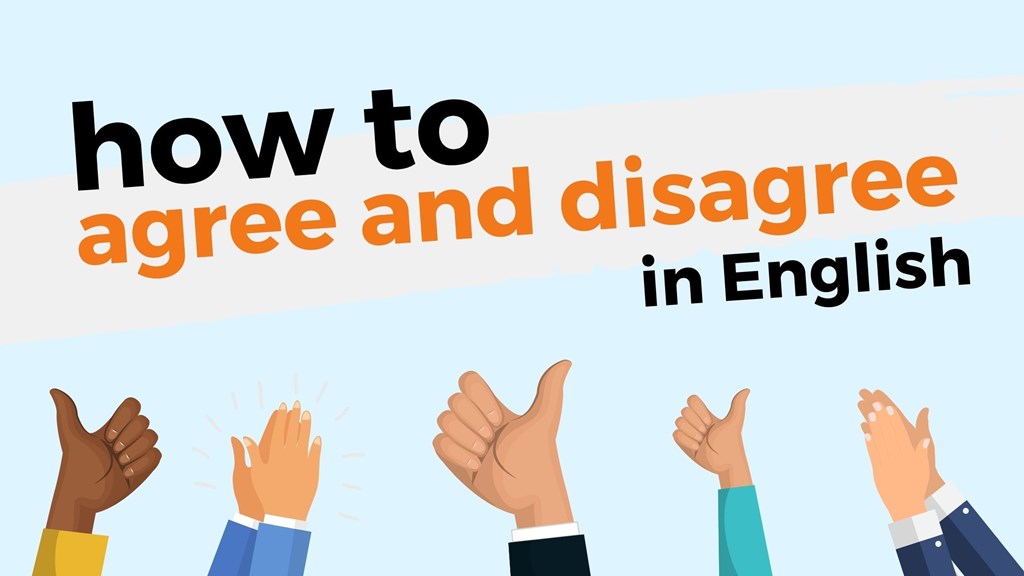杠就是你对 !"战略性同意 "劝退杠精 ~





▲点击进入 相应板块
" Agreement and
Disagreement"
PART ONE
△
点击播放音频
KEY WORDS
图片均来源于网络 | 侵删
加小助手VX【luluxjg2】领取全文逐字稿


Why This Matters


In English-speaking cultures, people often value politeness and indirectness, especially when disagreeing

In some cultures, being direct is normal—but in English, tone and softening language are very important

Knowing how to agree/disagree shows confidence and helps in debates, meetings, and casual chats


Ways to Show Agreement
Introduce useful expressions and short example conversations:


Informal or Everyday Use:
♦ “I know, right?”
♦ “Totally!”
♦ “That’s so true.”
♦ “Exactly!”
♦ “You can say that again.”

Polite/Professional Use:
♦ “I agree with you.”
♦ “That’s a good point.”
♦ “I think you’re right.”
♦ “I couldn’t agree more.”
♦ “Absolutely, I feel the same way.”

节目文稿全记录
#864

Hello again欢迎来到Happy Hour英文小酒馆。关注公众号璐璐的英文小酒馆,加入我们的酒馆社群,邂逅更精彩更广阔的世界
Hi, everyone and welcome back to Happy Hour, 欢迎回来酒馆. Hi, 安澜.
Hi, Lulu. Hi, everyone!
Before we get into today's topic, it's a really lovely day, isn't it?
No, it’s not, it's horrible.
I admit it's really hot.
No, it's just horrible.
What is wrong with you?
What's wrong with you?
Are you being a 杠精?
How could you tell?
Yeah, because the 安澜I know is a lovely person.
But I guess we're gonna talk about agreement, disagreement. And I guess how not to be a 杠精.
Pretty much. So yeah, we're gonna look at some expressions to show agreement and also some expressions to show disagreement and some expressions when you just don't really care.
Yeah. See, most people think why do I need to learn so many of these expressions? I can just say, I agree, I disagree. But It's so much more complex than that.
It is very very very complex.
Now the thing that makes me laugh with some students when they say I agree or I disagree, actually they sound rather rude in English. Because in English speaking culture, we do value politeness, indirectness, particularly when we are disagreeing.
You...not just in English speaking culture, in Chinese we are the king of like politeness and indirectness. It's just that I think people you cannot like learners can't really just directly translate from one language to another.
Exactly, because there are certain phrases in Chinese and there are certain phrases in English that one, they don't translate; two they're very much based on culture.
Yeah, and it's also when you're learning a foreign language, I guess you start from the very basics. You don't really learn the nuance and the subtlety that the small details until you're truly advanced.
Well, exactly. And if you consider that English speaking culture is an incredibly wide net, it's an incredibly wide area. So how British people agree and disagree is completely different from how Americans would agree and disagree.
Exactly.
And how Americans will agree and disagree is completely different to how Australians would and so on and so on and so on.
I would say British people in the whole English speaking world, perhaps it's a little bit more or a lot more indirect. You guys like to resort to sarcasm.
That's true.
And hidden insults.
That is also true.
So tones and softening language is very very important.
But let's start with the basics. Let's start with showing agreement because that's easy.
Because usually you wouldn't really go wrong with agreeing with other people.
Exactly.
Well, in most of the cases, you wouldn't easily, or you will not easily offend someone by agreeing with them. Because everyone when they voice their opinions, it's always easier for them to accept agreement rather than disagreement.
Precisely.
So I thought before we get into this, I do want to clarify one thing. You know this whole “I couldn't agree more,” I think over the years when Chinese learners are trying to learn this phrase, it got changed. And then, there are lots of mistakes and confusion around it because it should be “I couldn't agree more.” right?
Yes.
It's like I couldn't possibly agree with you more because I already agree with you maximum level.
I know, I've heard “I could agree more.”
I heard “I can’t agree anymore,” which is completely the opposite meaning. You don't really say “I can't agree more.” right? It’s “I couldn’t.”
I couldn't, because it's a hypothetical situation.
它是个虚拟语气, so “I couldn't agree more,” which means I'm already at the maximum level of agreement.
Yeah.
So getting back to how to express agreement, I would say let's divide it into informal or everyday use. You don't really say, “I agree” you probably say “exactly.”
Totally.
Totally, exactly.
I know, right?
Yeah, “I know, right?” Let's try that. It's really hot today.
I know, right?
It’s like “就是说呀!”
“My boss is the devil, is such a slave driver. I mean who is he to tell me to work overtime every day?”
Exactly
Or totally.
Yeah, totally
And there's a very interesting expression that “you can say that again.”
Yeah. So that means I agree with you so much that you can say it again and I'll agree with you.
But usually that's not an invitation for you to say it again.
No, no, no. Please don't.
Let's try that, give me something.
Yeah, the weather was really really nice at the moment. It's really hot for this time of year.
You can say that again.
Or in any sort of comments, for example, going to restaurant is getting so much more expensive nowadays.
Oh, you could say that again.
Yeah. So “you can say that again” literally means “Yeah exactly!” “I totally agree with you,” or you can simply say “that's so true.”
Yes.
But this is more like everyday use. In professional sense, if you're saying to your boss, you probably wouldn't say “you can say that again,” unless you have a very flat sort of structure and very casual relationship, otherwise you probably would say “I agree with you.”
Or “I would agree with you.”
“I would agree with you.” Wouldn't that sound like but I actually don't agree with you?
It can do, but it also is a softener.
So for example, if you say I would agree with you on that, it has the meaning of like I don't completely agree with you. So if you don't want to commit yourself.
There's a catch. Well, in that case, you can also say, “I suppose, I suppose you're right.” Yeah, so “I suppose you're right.” It's like, “Yeah, yeah, I guess you're right.” It's got that meaning... it's like not as strong as “I couldn't agree more.” It's more like not 100%, but I guess 80% you're right. I suppose you're right.
I think you're right, but if you want to say that you agree, you can say things like “that's a good point.”
That's a good point, but I really wouldn't recommend you say this to people who are significantly more senior to you, because it can sound a bit patronizing.
It's the sort of thing that a boss would say to their subordinate.
Or people who are peers. “I think you're right.” Or you can still use stronger language like “absolutely.” “I feel that way as well.” “I feel the same way.”
Yeah, “absolutely.” “I feel the same way.” “I think the same way.” You can use those type of expressions as well.
Alternatively, you can say “I'm in favor of it.” This is very formal. “I'm in favor of your suggestion” like in a meeting, someone proposed something you can say “I'm in favor of this proposal.” “I'm all for it.” By the way, I don't know about you. I know people in general like to be agreed with, but I have a problem if when I'm talking and someone keep giving me that sense of agreement, if they keep like “Yeah, yeah, that's a great idea. I couldn't agree more.” When it's done excessively...
You don't like a yesman.
I don't like a yesman. Of course I don't like a 杠精, but yesman would just give me two feelings.
First of all, I think you're just way too keen. And that makes me question like what is wrong with you? Are you trying to suck up? Or it could give me the feeling like you're just trying to humor me.
Yeah. So you notice that the ways that we say agreement, they're all kind of relatively flat, I would say. We don't say “Oh, that's brilliant. That's such a great idea.”
Sounds too insincere.
It sounds very insincere and it also sounds a little bit like you’re being a yesman, or a yesperson.
I wouldn't put it past you to use agreement as a way to 阴阳别人 as sarcasm.
We do that all the time, but the thing is that we change the pronunciation. We make the intonation a little bit more up and down.
For example, “I agree with you.” or “that's a good point.”
I know that when British people say “That's interesting.” It's never a good thing.
No. That just means that I think you're stupid.
Yeah. Okay.

排版长图:Jer.ry
文稿校对:徐一鸣 & Jenny
图片来源:均来源于网络 | 侵删

星标 “璐璐的英文小酒馆”
听见更精彩的故事,遇见更广阔的世界







▲点击以上图片,Get世界精选好物













